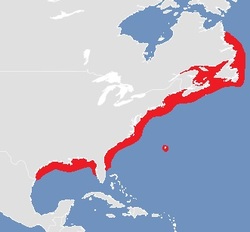
Common Name
Atlantic Sturgeon
Year Described
Mitchill, 1815
Identification
Dorsal Fin: 30-46
Anal Fin: 22-32
Gill Rakers: 17-27 (mean of 21.6)
Dorsal Scutes: 7-11
Lateral Scutes: 24-35
Ventral Scutes: 8-11
Body elongate, flattened ventrally, with a pentagonal cross-section. Top of head soft, cartilaginous. Snout rather long (in large specimens up to 0.6 time in post-orbital length or 4.0 times eye diameter) with four sensory barbels (reaching upper lip). Mouth width about half interorbital distance. Three rows of large scutes on body: post-dorsal and pre-anal scutes paired. There are 2-6 small scutes between lateral scute row and anal fin base. Viscera pale or with body pigment. Dorsal, anal, and pelvic fins set far back on body. Anal fin origin over mid-base of dorsal fin. Dorsal margin falcate. Pelvic fin rays well short of dorsal origin when depressed. Pectoral fins pointed; low on body. Caudal fin heterocercal with rounded lower lobe.
Color
Brownish, gray, or blue-black above grading to pale below. Scutes often paler than body or with white points/keels. Edges of fins contrasting white. Anal fin all white. Juveniles similar in color to adults.
Size
Mature adults from 183-250cm. Maximum size to 403cm.
Habitat
Estuaries and coastal marine waters near the bottom (to 50m.). Ascends rivers to spawn.
Range Map

Range
Labrador, Canada to northeastern Florida, with strays to Bermuda. Also a disjunct population in the Gulf of Mexico from western Florida to the Mississippi Delta.
References
Smith, C. Lavett. The Inland Fishes of New York State. 1985. New York State Department of Environmental Conservation. Albany, NY, 522 pp.
Vladykov, V. D. and J. R. Greeley. 1963. Order Acipenseroidei. In: Fishes of the Western North Atlantic. Memoir, Sears Foundation for Marine Research, Number 1. Yale Univ. New Haven, CT, p. 24-60.
Other Notes
The Gulf of Mexico population is known as A. oxyrinchus desotoi. Has more square scutes and carina with strong hooks. Also a longer spleen.